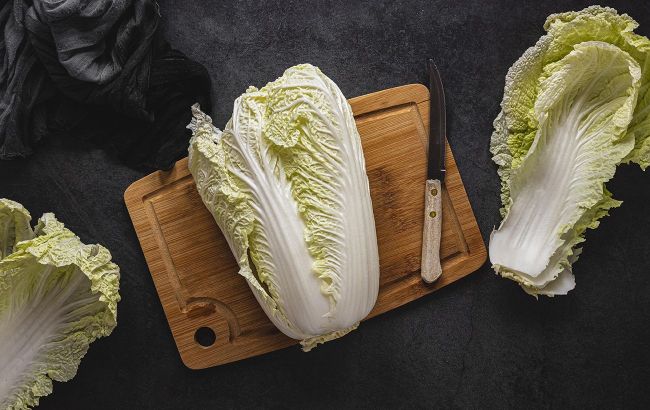How napa cabbage can help combat seasonal illnesses and stress
 Benefits of napa cabbage and who should avoid eating it (Photo: freepik.com)
Benefits of napa cabbage and who should avoid eating it (Photo: freepik.com)
Napa cabbage can be often seen in supermarkets, and many people buy it to make nutritious vitamin salads during the winter. It is very beneficial, especially during periods of vitamin deficiency and frequent colds, as it contains twice as much vitamin C as regular white cabbage, according to dietitian Natalia Yachminska.
Benefits of napa cabbage
In 100 grams of this vegetable, there is 45% of the daily norm of vitamin C. It improves iron absorption, boosts immunity, stimulates the production of leukocytes in the blood, and promotes bone mineralization.
The dietitian recommends including napa cabbage in the diet 2-3 times a week. This can help stimulate metabolic processes, improve blood composition, cleanse the body of harmful substances, and provide the body with strength to combat seasonal colds and stress.
Useful properties of napa cabbage
-
Eliminates toxins and poisonous substances from the body
-
Strengthens the immune system, an excellent preventive measure against colds
-
Fights free radicals and helps reduce bad cholesterol levels
-
Stimulates the digestive tract
-
Normalizes blood sugar levels (in type 2 diabetes), improves overall health
-
Facilitates cleansing and normalization of the intestines
-
Aids in weight loss (rich in fiber, low in calories and fat, vitamins in it accelerate metabolism, influencing weight loss speed)
-
Stabilizes metabolism, hormonal balance, rejuvenates
-
Beneficial effects on the condition of the skin, nails, and hair
-
Relieves insomnia and chronic fatigue syndrome, alleviates the effects of stress and depression
-
Normalizes elevated blood pressure
-
Removes excess water from the body
How to store napa cabbage
Napa cabbage keeps well throughout the winter in its fresh form. Until spring, it retains the vitamins, distinguishing it from many other vegetables.
It is best to store this cabbage in a cellar. If not available, you can store it in the refrigerator in the vegetable compartment. If there is no separate space, place the cabbage in a plastic container with a lid.
The cabbage for storage should be dry, without damage or signs of disease. It should be wrapped in food film and only washed before cooking. Following these recommendations, the vegetable can be stored in the refrigerator for a month.
A sliced cabbage head can be kept in the refrigerator for 5-7 days, but it should be thoroughly dried with a paper towel before that.
Napa cabbage is used not only for salads but also for hot dishes such as stuffed cabbage rolls, stewed, and fried cabbage.
Who should avoid eating napa cabbage
People suffering from kidney stones should refrain from consuming this cabbage because it is rich in purines. Fresh cabbage should not be eaten in cases of gastritis with increased acidity, pancreatitis, exacerbation of peptic ulcer disease of the stomach, duodenum, colitis, and diarrhea.
Previously, we wrote about the importance of potassium and where to find it.

